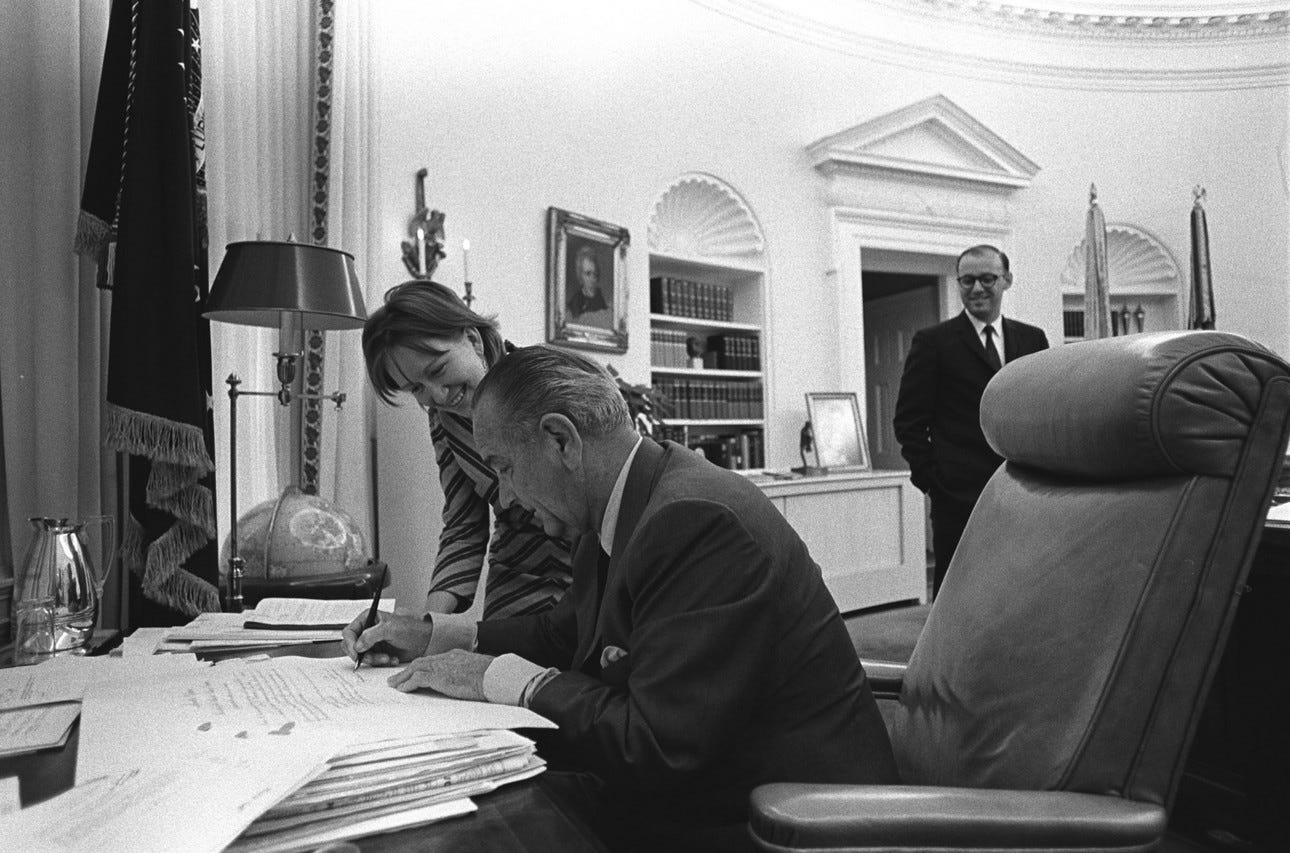Team of Rivals: Introduction
A bit about Doris Goodwin + Lincoln's immense bibliography
Hello, readers!
Today we’re kicking off our reading of Doris Kearns Goodwin’s remarkable 2005 history/biography of Abraham Lincoln, Team of Rivals. This is not a standard cradle-to-grave biography. Some of our 16th president’s early life is covered, but the bulk of the narrative takes place during the Civil War, when Lincoln’s true political genius shone through and helped the nation escape permanent dissolution.
It’s also a comparative biography. This means that Goodwin looks at the lives and motivations of the men who surrounded Lincoln in this era, primarily the three politicians who were also vying for the 1860 republication nomination for president: William Seward, Salmon Chase, and Edward Bates — all of whom became part of Lincoln’s cabinet and formed the “team of rivals.”
Today, I’ll briefly introduce you to Doris Kearns Goodwin, as well as Abraham Lincoln’s immense bibliography. Next week, I’ll recap the first two chapters of the book. (Here’s the reading schedule again, if needed.)
A little bit about DKG
Doris Kearns Goodwin has spent her entire life studying and writing about presidential politics. In the ‘60s, she interned in Lyndon Johnson’s White House, getting a first-hand look at the ins and outs of a presidential administration. From there, Goodwin set her sights less on active government work and more on studying history. Her first biography, Lyndon Johnson and the American Dream (1976), was published nearly 50 years ago and launched her writing career.
From there, she wrote and published a string of best-selling books that veered more towards popular history than academic, and catapulted Goodwin to being more well-known than just about any other American historian:
No Ordinary Time: Franklin and Eleanor Roosevelt: The Home Front in World War II (1994; Pulitzer winner)
Team of Rivals: The Political Genius of Abraham Lincoln (2005)
The Bully Pulpit: Theodore Roosevelt, William Howard Taft, and the Golden Age of Journalism (2013)
Goodwin is also an avid baseball fan; she’s a loyal season ticket holder for her beloved Boston Red Sox and even wrote a memoir of her fandom, Wait Till Next Year (1997).
Just last month, she published another memoir, An Unfinished Love Story, which details her relationship with her late husband Richard Goodwin, who was a presidential advisor in the 1960s and ‘70s. I haven’t read this one yet, but it’s waiting for me on my bookshelf. I’ll definitely get to it by the time we’re done with Rivals.
Speaking of which, of all Goodwin’s books, Team of Rivals has especially gripped average readers and high-level leaders alike. That may be because of the subject himself. As Goodwin writes in the introduction to our summer read:
“the uniquely American story of Abraham Lincoln has unequalled power to captivate the imagination and to inspire emotion.”
Let’s explore that thread just a bit more.
The most written-about president

Outside of Jesus Christ himself, no other historical figure has as many pages dedicated to his life as Abraham Lincoln. Though it’s hard to accurately track, it’s estimated that there are 16,000-20,000 books about the Great Emancipator. That means, on average, there’s been a Lincoln book published roughly every 3-5 days since his death in 1865. The bibliography of Lincoln is simply overwhelming.
What is it about him that’s so compelling, both for authors (who keep writing about him) and readers (who keep buying the books and reading about him)?
In Team of Rivals’ introduction, Goodwin gets to the heart of his magnetism. Firstly, like almost every interesting character from history, he was immensely complicated:
“plain and complex, shrewd and transparent, tender and iron-willed”
He was not a black-and-white fellow. Like Shrek says of ogres, Lincoln had as many layers as an onion. Attempting to tease out his motivations and reasonings among all his vastly important political moves has created endless fodder for historians. Nothing about him was expected or obvious.
Secondly, Lincoln had uncharacteristic emotional depth. Given his position, he displayed deep empathy, genuine humor, and a truly incredible amount of self-awareness. He was, simply put, human. It’s usually the case that brilliant leaders come across as utterly unrelatable — they’re simply superhuman in their energy and brilliance. But there’s so much in Lincoln where we can recognize ourselves and aspire to his surprisingly attainable example.
As Goodwin notes, in a paragraph that functions as the thesis of the book, it’s Lincoln’s personality that so draws us to him:
“This, then, is a story of Lincoln's political genius revealed through his extraordinary array of personal qualities that enabled him to form friendships with men who had previously opposed him; to repair injured feelings that, left untended, might have escalated into permanent hostility; to assume responsibility for the failures of subordinates; to share credit with ease; and to learn from mistakes. He possessed an acute understanding of the sources of power inherent in the presidency, an unparalleled ability to keep his governing coalition intact, a tough-minded appreciation of the need to protect his presidential prerogatives, and a masterful sense of timing. His success in dealing with the strong egos of the men in his cabinet suggests that in the hands of a truly great politician the qualities we generally associate with decency and morality— kindness, sensitivity, compassion, honesty, and empathy—can also be impressive political resources.”
Stirring, isn’t it?! If there’s any president worth knowing more about, it’s Abraham Lincoln.
If you’ve read the introduction, I’d love to hear anything that stood out (it’s only a few pages, but I took quite a few notes!). Thanks for reading along with me.
-Jeremy






I got a little bit of a jumpstart on the book this week – I'm really excited to be reading a non-fiction book with this group, and this one in particular against the backdrop of an election year (by design, of course – great idea, Jeremy!)
Several things in the introduction caught my attention. Here are just a couple:
-- The fact that "As a young man, Lincoln worried that the 'field of glory' had been harvested by the founding fathers, that nothing had been left for his generation but modest ambitions". (Ha!) "Without the march of events that led to the Civil War, Lincoln still would have been a good man, but most likely never would have been publicly recognized as a great man." Not exactly a revelation, but always frustrating to think that such dramatic events are required in order to recognize greatness in a person.
-- Goodwin's distinction between melancholy and depression. Goodwin disputes the idea that Lincoln suffered from clinical depression. Melancholy, she says, is not an illness but an "aspect of one's nature" which "has been recognized by artists and writers for centuries as a potential source of creativity and achievement." As someone who works in a creative field, I've often pondered that "tortured artist" theory, wondered how much validity there is to that theory vs. how much it's a way for us to explain away the darker sides of our idols, in whom we don't necessarily care to see flaws. I'm curious to see how melancholy comes into play in Goodwin's view of Lincoln.
Can't wait to continue reading and see what discussions this book prompts for us!
DKG is a brilliant storyteller telling the story of another brilliant storyteller. How cool is that?! Her stories are so deeply thought out, her perspectives unique, and her prose simply beautiful. She just seems more relatable than many historians. I think it was after this book was released that she was carried onto the stage of one of the late-night shows by a bunch of hunky guys dressed as Lincolns. I saw that and just thought, "This lady is pretty cool." She writes about deep things but can also laugh at herself. There was a documentary about her and her husband that showed bookshelves loaded with books in every room of their house. And they had read so very many of them. So. Dang. Cool. This is going to be a wonderful adventure.